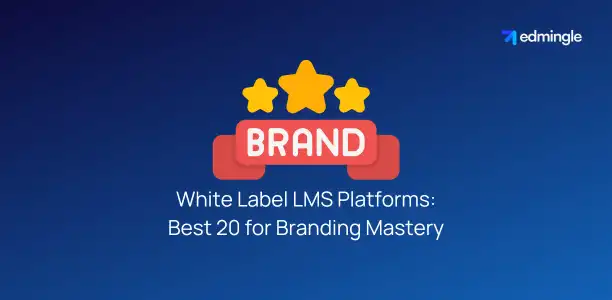
In today’s fast-paced digital world. Having a personalized touch in every facet of your business can make all the difference.
With this reference, white label LMS platforms are your golden ticket. To branding excellence in the realm of e-learning, the future of education.
Imagine delivering top-notch content under your brand’s unique banner.
Sounds intriguing, right?
In this blog, we’ll dive deep to explore everything about white label LMS platforms.
What are White Label LMS Platforms?
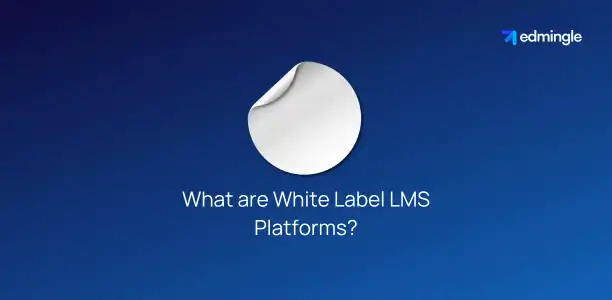
In the context of software and digital products, such as an LMS. A white-label solution means that the software can be rebranded and customized. To appear as though it was made by the company using or selling it.
This allows businesses to offer products or services to their customers under their own brand name. Without having to develop the product from scratch.
The primary advantage of white label LMS platforms is that it saves time & development costs. While providing companies the flexibility to present a product. That aligns with their brand identity & business offerings.
Explore about Edmingle’s White-Labelling.
What does ‘White Label’ Mean?
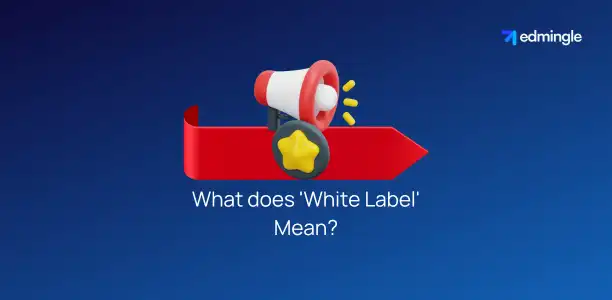
The term “white label” refers to a product or service that is produced by one company. And then rebranded & sold by another company as its own.
The concept comes from the idea of a blank (white) label on the product or service. That can be filled in or customized by the reselling company.
1.White Label Products
These are physical goods produced by one company. But packaged and sold under another company’s brand name.
Example: A supermarket might sell products like cereals, sauces, or even electronics under its brand name. Even though these products are manufactured by third-party companies.
2.White Label Services
These refer more to services, software, or digital products. That are created by one company and then rebranded & sold by another as their own.
Example: Many financial institutions use white label software solutions for their online banking platforms. Instead of creating their own software from scratch. They use a platform developed by a third party and brand it as their own.
3.Types of White Labeled Products & Services
White-labeled products and services span a broad range of industries and business sectors. They are essentially offerings created by one entity but branded and sold by another.
Here’s a brief look at some of the common types:
| Software & Apps | Digital Courses & LMS | E-commerce Platforms | Food & Beverages | Payment Gateways |
| Financial Services | Physical Products | Web Hosting | Digital Marketing Tools | Beauty & Personal Care |
In short, the white-label model offers scalability and flexibility. Hence, enabling businesses to expand their offerings.
Without the heavy lifting of developing products or services from the ground up.
How do White Label LMS Platforms Work?
White labeling is basically a business strategy/model.
One where a company produces some generic product or service and then sells it to another company. Which then rebrands and sells it as their own.
Here’s a step-by-step explanation of how white label LMS platforms typically work:
| 1.Production by the Original Company | The original company (producer/manufacturer) creates or develops LMS software. But doesn’t brand it with its own logo or identity. Instead, it’s designed in a generic way to be adaptable for multiple brands. |
| 2.Purchase for Rebranding | Another company (the reseller) purchases this generic LMS. With the intent to brand and sell it. They might buy the rights to sell it in a particular region or under certain terms. |
| 3.Customization & Branding | The reseller customizes the learning management system, if necessary. And adds its own branding elements. This could involve changing the name, adding a logo, using company colors. Or any other modifications that align with the reseller’s brand identity. |
| 4.Sales & Marketing | The reseller then markets and sells the LMS as if it were its own. Without mentioning anything about the original producer. Customers often remain unaware of the producer/original company. |
| 5.Support & Maintenance | Depending on the agreement between the producer and the reseller. After-sales support can be provided by either party. For an LMS like software products. The updates & maintenance can also be a shared responsibility. Or lie solely with one of the parties. |
| 6.Profit Model | The original company benefits by selling in bulk or via subscription to the reseller. While the reseller profits from marking up the price when selling to end users. Or by bundling it with other services. |
White labeling is prevalent in many industries. From food and cosmetics to digital services and software.
It’s also beneficial for businesses that want to expand their product range quickly. Or offer solutions without the extensive time and financial investment. That is generally required to develop new solution from scratch.
We’re thrilled to share that using Edmingle for your training business helps you reduce your operational cost by 20%.
8 Benefits of Using a White Label LMS Platform
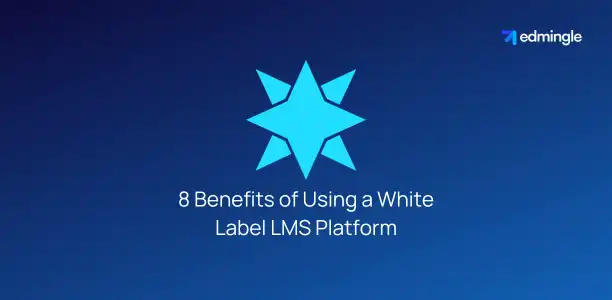
The e-learning industry has witnessed a remarkable surge over the past few years. With many businesses transitioning towards online learning platforms.
Among the various available options, white label online course platforms stand out. Particularly because they offer myriad benefits to businesses and educators.
The eight main benefits of using a white-label LMS are:
- Brand consistency: With customizable features, you can customize the LMS with your logos, colors, and domain. Hence, ensuring that learners have a consistent brand experience. This continuity reinforces brand identity and can enhance trust among your audience.
- Increased credibility: A branded LMS can provide a more professional look. Instilling confidence in your students about the quality and legitimacy of the content they are accessing.
- Tailored user experience: Beyond just branding. A white-label solution often allows organizations to customize the user interface. Thus, ensuring the platform aligns with the learners’ needs and expectations.
- Competitive advantage: Standing out in a crowded market is crucial. A white-labeled LMS allows you to offer a unique and differentiated e-learning experience. As compared to competitors who might be using generic platforms.
- Full control over content: You have complete autonomy over the courses. Ensuring that they align with your organization’s objectives, values & training needs.
- Cost-effective: Developing a custom LMS from scratch can be time-consuming and expensive. A white-label solution provides a balance. Between customization and cost. Thus, giving you a tailored platform without the high development costs.
- Concentrate on your primary expertise: These platforms handle the technical intricacies. Hence, letting you channel your energy and expertise into creating exceptional content. Instead of fumbling with backend issues. You can better emphasize on curriculum development.
- Increase in earnings: Having a professional, polished platform lets you charge premium rates for your training courses. Moreover, without the costs of developing a platform from scratch. A larger portion of your earnings translates to profit.
In short, a white-label LMS delivers e-learning smoothly. Without the challenges & costs of building an LMS from the ground up.
Furthermore, by aligning the LMS with your brand and organizational goals. You can further enhance the learning experience for your audience.
Since we talked about being cost-effective. Here’s a complete guide to learning management system pricing.
8 Components that can be White-Labelled within an LMS
Within a learning management system, there are several components that you can brand & white-label.
To better align the platform with your company’s visual identity. And ensure a seamless learning experience for your users.
Here are 8 key elements that can typically be white-labeled in an LMS:
| 1.User Interface (UI): Adjust the look and feel of the LMS to match your company’s branding guidelines. This includes colors, fonts, and overall design elements. | 5.Certificates: If your LMS issues completion certificates. You can design them to match your company’s branding. |
| 2.Logo Placement: Replace the LMS provider’s logo with your own on all pages. Even on custom reports & communications. | 6.Email Notifications: Customize the learning material, design, and sender details of automated emails sent by the LMS. Such as course enrollments, reminders, or updates. |
| 3.Domain Name: Use a custom domain for your LMS. Thus, making it appear as a native part of your organization’s online presence. | 7.Mobile App: If the LMS provider offers a mobile app. Some allow you to white-label the app. Hence, ensuring a consistent learning experience across devices. |
| 4.Login & Signup Pages: Customize the login and registration pages with your branding & design preferences. | 8.Language & Terminology: Adjust the platform’s language to use terms that resonate with your target audience or industry. |
Using an LMS for selling courses is essential for building a brand & passive income in today’s digital age.
In such a scenario. White-labeling an LMS allows organizations to provide a cohesive and professional learning environment. Thereby enhancing user trust and engagement.
5 Special Features of a White Label LMS Platform
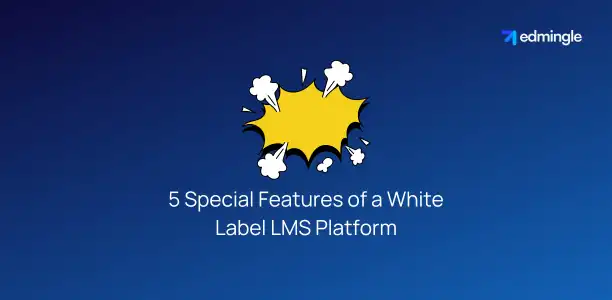
Learning management systems offer unparalleled convenience and flexibility to learners and educators alike.
And when specifically considering a white label LMS. Certain features stand out so as to allow the tailoring of the platform.
- User-friendliness (UI & UX): A clean, intuitive user interface (UI) combined with a seamless user experience (UX). It ensures that learners can navigate the platform effortlessly. Hence, reducing learning curves and boosting student engagement.
- Custom API integrations & SSO: With API integrations, your LMS can seamlessly communicate with other tools or platforms. Single Sign-On (SSO) further enhances user convenience. By allowing one set of login credentials for multiple applications.
- Custom Certificates & Gamification: Reward learners with personalized certificates upon course completion. Gamification elements like badges, leaderboards, and points can make learning more engaging & competitive.
- Seamless Communication: Send course reminders, updates, or marketing campaigns automatically. It ensures consistent communication with learners, keeping them engaged and informed.
- SaaS Business Model: Software as a Service (SaaS) ensures you access the LMS via the internet without installing software locally. It’s cost-effective, reduces technical burdens, and allows for automatic updates.
A white label LMS is not just about branding. But tailoring the learning experience to match your business’s ethos, goals, and user needs.
To know more about the SaaS business model. Check our blog on SaaS LMS.
20 Best White Label LMS Platforms in 2024
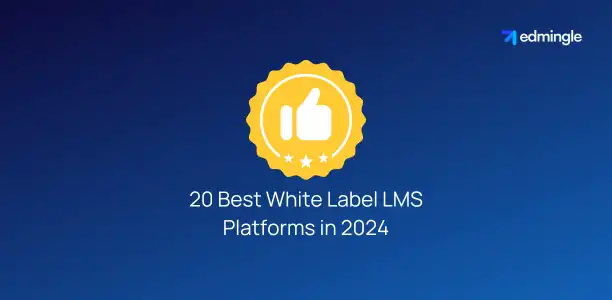
In the ever-evolving landscape of e-learning. White label LMS platforms have proven their flexibility of launching branded online course business.
All without the heavy lifting of building a platform from scratch. Here are the 20 best platforms you should consider.
1.Edmingle
Edmingle is a rapidly growing SaaS LMS with a wide range of useful features. It comes with robust integrations and delivers a seamless learning experience. It stands apart from the rest with its exceptional customer support & service and 100% white-labelling.
The platform helps training businesses effortlessly build, manage & scale their own branded online academies.
To further prove its reliability. Edmingle caters to more than 2 million learners & 5000+ training businesses across 160+ countries. This also includes leaders like MIT SDE, McGraw Hill and many more.
2.EducateMe
Focused on providing a comprehensive learning experience. EducateMe offers key features with interactive elements including quizzes, assignments & analytics. To track learner progress & course completion rates.
3.Talent LMS
Built mainly for businesses. Talent LMS provides a cloud LMS solution that’s both scalable and customizable for diverse training needs.
If you’re a small business, you might like our blog on LMS for Small Businesses.
4.Teachfloor
A white-label option for online academies & organizations. Teachfloor offers a curriculum builder, scheduling & reporting features.
5.Skilljar
Skilljar enables the creation of adaptive learning paths for a personalized experience. It also supports various multimedia content types/formats like videos & images.
6.AcademyOcean
AcademyOcean emphasizes learner engagement with videos, gamified quizzes, certificates & unique learning journey for each student.
7.Paradiso LMS
A customizable LMS, Paradiso LMS offers robust branding. It also provides multi-lingual support & seamless integration capabilities for a global reach.
It also makes for a good option as an LMS for Language Teaching.
8.Docebo
Emphasizing AI-powered personalized learning. Docebo also offers social learning and gamification features to enhance the overall learner experience.
9.LearnUpon
Catering mainly to employee/corporate training, LearnUpon offers scalable solutions. Along with integrations and a user-friendly interface.
10.Northpass/Gainsight
Focused on creating industry-leading customer education/training programs. Northpass (now Gainsight) offers unique customization features.
This makes it a good choice as an LMS for customer training.
11.Plume
A white label learning management system to meet the unique demands of any business. Plume offers full branding & UX customization. It also comes with custom-built features, integrations, reporting, analytics & dashboards
12.ProProfs
With an all-inclusive approach. ProProfs Training Maker offers a complete training solution. It offers an engaging course library and templates to help build your course from scratch.
13.e-khool LMS
A simple yet powerful platform. e-khool LMS offers all essential tools for course creation, student management, and analytics.
14.mCourser
mCourser is a comprehensive & highly scalable LMS platform. It is also an eContent distribution platform.
15.Kajabi
Kajabi is more than just an LMS. It integrates marketing tools, course creation, and website building into one platform.
16.Teachable
With an easy-to-use interface, Teachable enables seamless student management. It also offers robust tracking & analytics.
Also Read: Difference Between White Label and Private Label LMS.
17.Thinkific
Praised for its flexibility. Thinkific is used by many educators to create, market, and sell their private label courses. Without any technical hitches.
18.LearnWorlds
With an emphasis on community-building. LearnWorlds offers an array of features that foster user interaction. Thus, making it a unique offering in the market.
19.Cudoo
Cudoo LMS enables affordable online language teaching and professional development courses. In over 160+ languages and dialects.
20.LMS Portals
LMS Portals provides a powerful white label SaaS platform. It comes with robust tools for user onboarding, messaging, knowledge management, analytics tool & more.
Note that this list is non-exhaustive. And also that each option mentioned here brings something unique to the table.
But what matters more is selecting the right one for you.
Is there Really a “Best” White-Label LMS Platform?
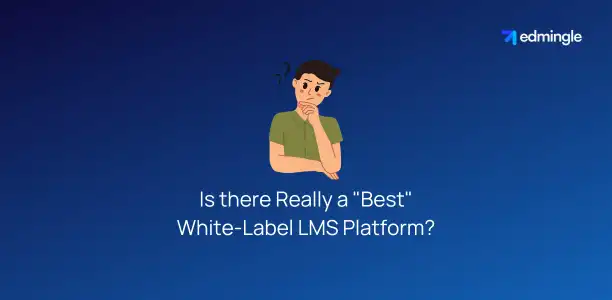
Now we know that choosing the best white label learning management system is crucial. But, the “best” platform often depends on individual business needs.
Here are some key factors to consider when making your choice:
- The flexibility in branding
- Features (To know about all the essential features of an LMS. Check our blog on learning management system features).
- The user experience
- Integration capabilities
- Pricing (Check our blog on learning management system pricing).
Many white label LMS platforms have made their mark in the industry. But the “best” is subjective.
Always evaluate based on your specific requirements. And perhaps even take advantage of free trials before committing.
Summary
In short. White label LMS platforms are not just a cost-effective alternative. But a comprehensive solution that benefits both businesses and learners.
Using them, you can offer personalized, branded educational experiences. Without the overhead of developing a platform from scratch.
The key, however, is to select a platform. That aligns seamlessly with your specific educational goals and brand/corporate identity.
Remember, the essence of a white label LMS lies in its ability to be rebranded and customized. Thereby, allowing you to maintain brand consistency & increase credibility.
FAQs on White-Label LMS Platforms
1.How does white-labeling benefit my online learning business?
White-labeling offers several advantages for online educators. The key benefits include professionalism, brand consistency, cost and time efficiency. Additionally, it also provides proper control over the user experience.
2.How is a white-label LMS platform used to build a brand?
Instead of starting from scratch. A white-label platform offers a ready-to-use framework. One that you can simply tailor to fit your brand.
3.What is the reason of removing the “Powered by” message from online training portals?
The “Powered by” message typically indicates the use of third-party application, solutions or platforms. Removing it serves several purposes like boosting professionalism, brand consistency & trust.
4.Do there exist any limitations of using a white-labelled LMS?
While white-label LMS platforms offer many benefits. They come with some potential limitations. These include less flexibility in core features and some form of dependency on the producer company. Additionally, there is a chance that the subscription or licensing fees can add up over time.

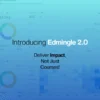
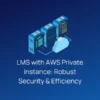



Comments (3)
52 Learning Management System Features | Comprehensive Guidesays:
September 1, 2023 at 12:22 pm[…] Read: 19 Top White Label LMS Platforms : The Complete Guide to Branding […]
The Ultimate Guide to Learning Management System Pricingsays:
September 9, 2023 at 9:27 am[…] Whether it’s tweaking the user interface, integrating specific third-party apps, or adding branded elements, such tailoring requires more sophisticated software and, consequently, often comes at a higher […]
Reduce Your Operational Cost by 40% with Edmingle!says:
September 12, 2023 at 7:19 am[…] Edmingle allows you to build, manage & scale your digital training academy effortlessly under your own brand. Rich with integrations, it cuts out your need to switch between multiple tools for spread out […]